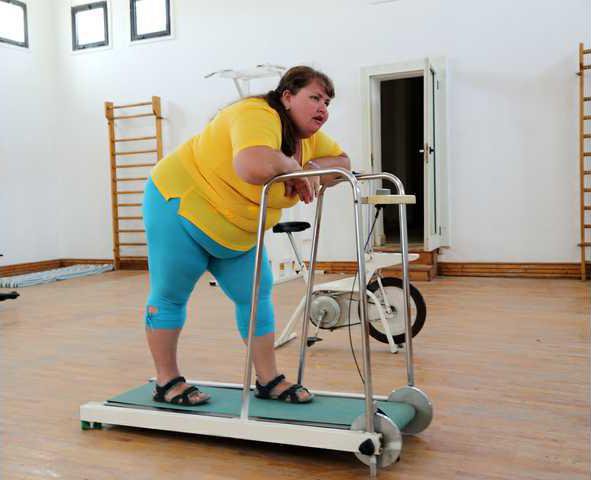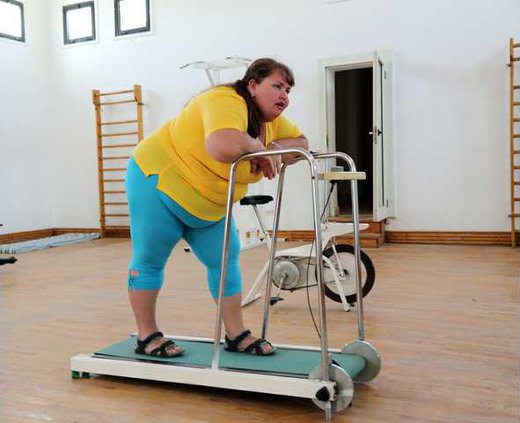Mirna Valerio, a Georgia teacher and coach, is 5 feet 7 inches tall and weighs to the best of her knowledge between 245-250 pounds.
By the standards of the Centers for Disease Control and Prevention, this puts her body-mass index near 40 and categorizes her as obese. A normal weight for Valerio, the CDC calculator says, would be between 118-159 pounds.
But Valerio is not normal, at least not in a country where only 20 percent of people meet the minimum standards for exercise. A cross-country coach and a marathoner, she runs long distances regularly and is training for a Tough Mudder, a famously difficult obstacle race. Among her accomplishments is completing a 100K race (62.14 miles) near Phoenix.
Valerio, 40, doesnt know her resting pulse or her blood pressure, but at her last physical, her doctor expressed no pressing concerns about her health. Her aerobic capacity and ability to run for long distances suggest she enjoys good health, and Valerio doesnt worry about weight. Health professionals worldwide, however, do.
The World Health Organization has pronounced obesity a global epidemic that threatens all age and socioeconomic groups. Its health consequences range from increased risk of premature death to serious chronic conditions that reduce the overall quality of life, the WHO warns.
Dr. Larry Cheskin, associate director of the Global Obesity Prevention Center at Johns Hopkins University, calls obesity a catastrophe happening in slow motion.
But even as obesity has increased worldwide, with the overweight now surpassing the underweight, the number of overweight athletes is on the rise.
Some exercise to lose weight, but others cheer the fat-acceptance movement and choose to ignore the scale. Valerio has done both. She started running to lose weight and initially shed 50 pounds, but she has since plateaued and is no longer trying to lose weight. Valerio has no problem with people calling her fat, but is she fit, and can she be healthy at that weight? Scientists have tried to answer the question.
In 2012, a study published in the European Heart Journal suggested that people can be both obese and metabolically healthy and fit, showing no signs of insulin resistance, diabetes and high blood pressure or cholesterol that often plague the sedentary obese.
Forty-six percent of obese participants were found to be metabolically healthy, and over the course of the study they had a 38 percent lower risk of death than other participants, and no significant difference in mortality when compared with normal-weight participants. When some individuals are aerobically fit, obesity can be a "benign condition" in terms of cardiovascular disease and mortality, the researchers said.
"Based on the data that our group and others have collected over years, we believe that getting exercise broadly and positively influences major body systems and organs and consequently contributes to making someone metabolically healthier, including obese people," the lead author, Dr. Francisco Ortega, said when the study was published.
More recently, a group of Swedish researchers concluded otherwise. They studied more than 1.3 million men over three decades and found that those of normal weight were less likely to die than the obese, even if the obese had a higher level of fitness.
Being aerobically fit appeared to offer no protection against death for those with body mass indices above 35, the lead author, Peter Nordstrom of Umea University in Sweden, told Reuters News Service.
But even BMI has come under fire lately as a measure of fitness. A study published in March in the International Journal of Obesity concluded that body mass is a poor measure of health. In the survey of 40,000 Americans, 29 percent of obese people were metabolically healthy, while 30 percent of those of normal weight were unhealthy.
Can you be fit and fat? Yes, you certainly can be, said Tony Babb, a researcher and professor of internal medicine at the Institute for Exercise and Environmental Medicine, a joint venture of Texas Health Presbyterian Hospital and UT Southwestern Medical Center in Dallas.
Babb said that, ironically, an obese person may carry more lean body mass and muscle than a normal-weight person. "They lug that weight all the time and have to do more work to move the body and need more muscle mass to support it," he said. And even normal weight people can carry surprising amounts of fat, a phenomenon known as the "skinny obese."
When it comes to oxygen uptake (also known as VO2), however, studies have shown that normal-weight people perform better, and the obese can improve lung function by losing weight.
Despite the conflicting research, most medical professionals agree that it's better to be normal weight than obese, and even the 2012 study spoke of a "subset" of obese people who were metabolically healthy. Dr. Bruce Lee, director of the Global Obesity Prevention Center at Johns Hopkins Bloomberg School of Public Health, said large-scale studies reveal trends, but that there are always individuals who are exceptions.
"We shouldn't misinterpret these studies that show trends as hard and fast rules," he said.
He also noted that the wide range of "normal" weight (in Valerio's case, from 118 to 159 pounds) shows that body types matter, too. (Something apples need to worry about more than pears, researchers said last year.)
Valerio, meanwhile, hasn't had time to read any of the studies. She's too busy teaching Spanish and coaching the cross-country team at a private school in Rabun Gap, Georgia, when she's not training for punishing long-distance races.
A Juilliard-trained opera singer, Valerio also blogs on her personal website, Fat Girl Running, and writes for Women's Running magazine. If she loses weight, that's fine, she says. If she doesn't, that's fine, too, but don't ask her exact weight.
"I used to have a scale, but I left it at my mom's house by mistake," she said. "If I do ever need to weigh myself, I know where to find it."
By the standards of the Centers for Disease Control and Prevention, this puts her body-mass index near 40 and categorizes her as obese. A normal weight for Valerio, the CDC calculator says, would be between 118-159 pounds.
But Valerio is not normal, at least not in a country where only 20 percent of people meet the minimum standards for exercise. A cross-country coach and a marathoner, she runs long distances regularly and is training for a Tough Mudder, a famously difficult obstacle race. Among her accomplishments is completing a 100K race (62.14 miles) near Phoenix.
Valerio, 40, doesnt know her resting pulse or her blood pressure, but at her last physical, her doctor expressed no pressing concerns about her health. Her aerobic capacity and ability to run for long distances suggest she enjoys good health, and Valerio doesnt worry about weight. Health professionals worldwide, however, do.
The World Health Organization has pronounced obesity a global epidemic that threatens all age and socioeconomic groups. Its health consequences range from increased risk of premature death to serious chronic conditions that reduce the overall quality of life, the WHO warns.
Dr. Larry Cheskin, associate director of the Global Obesity Prevention Center at Johns Hopkins University, calls obesity a catastrophe happening in slow motion.
But even as obesity has increased worldwide, with the overweight now surpassing the underweight, the number of overweight athletes is on the rise.
Some exercise to lose weight, but others cheer the fat-acceptance movement and choose to ignore the scale. Valerio has done both. She started running to lose weight and initially shed 50 pounds, but she has since plateaued and is no longer trying to lose weight. Valerio has no problem with people calling her fat, but is she fit, and can she be healthy at that weight? Scientists have tried to answer the question.
In 2012, a study published in the European Heart Journal suggested that people can be both obese and metabolically healthy and fit, showing no signs of insulin resistance, diabetes and high blood pressure or cholesterol that often plague the sedentary obese.
Forty-six percent of obese participants were found to be metabolically healthy, and over the course of the study they had a 38 percent lower risk of death than other participants, and no significant difference in mortality when compared with normal-weight participants. When some individuals are aerobically fit, obesity can be a "benign condition" in terms of cardiovascular disease and mortality, the researchers said.
"Based on the data that our group and others have collected over years, we believe that getting exercise broadly and positively influences major body systems and organs and consequently contributes to making someone metabolically healthier, including obese people," the lead author, Dr. Francisco Ortega, said when the study was published.
More recently, a group of Swedish researchers concluded otherwise. They studied more than 1.3 million men over three decades and found that those of normal weight were less likely to die than the obese, even if the obese had a higher level of fitness.
Being aerobically fit appeared to offer no protection against death for those with body mass indices above 35, the lead author, Peter Nordstrom of Umea University in Sweden, told Reuters News Service.
But even BMI has come under fire lately as a measure of fitness. A study published in March in the International Journal of Obesity concluded that body mass is a poor measure of health. In the survey of 40,000 Americans, 29 percent of obese people were metabolically healthy, while 30 percent of those of normal weight were unhealthy.
Can you be fit and fat? Yes, you certainly can be, said Tony Babb, a researcher and professor of internal medicine at the Institute for Exercise and Environmental Medicine, a joint venture of Texas Health Presbyterian Hospital and UT Southwestern Medical Center in Dallas.
Babb said that, ironically, an obese person may carry more lean body mass and muscle than a normal-weight person. "They lug that weight all the time and have to do more work to move the body and need more muscle mass to support it," he said. And even normal weight people can carry surprising amounts of fat, a phenomenon known as the "skinny obese."
When it comes to oxygen uptake (also known as VO2), however, studies have shown that normal-weight people perform better, and the obese can improve lung function by losing weight.
Despite the conflicting research, most medical professionals agree that it's better to be normal weight than obese, and even the 2012 study spoke of a "subset" of obese people who were metabolically healthy. Dr. Bruce Lee, director of the Global Obesity Prevention Center at Johns Hopkins Bloomberg School of Public Health, said large-scale studies reveal trends, but that there are always individuals who are exceptions.
"We shouldn't misinterpret these studies that show trends as hard and fast rules," he said.
He also noted that the wide range of "normal" weight (in Valerio's case, from 118 to 159 pounds) shows that body types matter, too. (Something apples need to worry about more than pears, researchers said last year.)
Valerio, meanwhile, hasn't had time to read any of the studies. She's too busy teaching Spanish and coaching the cross-country team at a private school in Rabun Gap, Georgia, when she's not training for punishing long-distance races.
A Juilliard-trained opera singer, Valerio also blogs on her personal website, Fat Girl Running, and writes for Women's Running magazine. If she loses weight, that's fine, she says. If she doesn't, that's fine, too, but don't ask her exact weight.
"I used to have a scale, but I left it at my mom's house by mistake," she said. "If I do ever need to weigh myself, I know where to find it."





